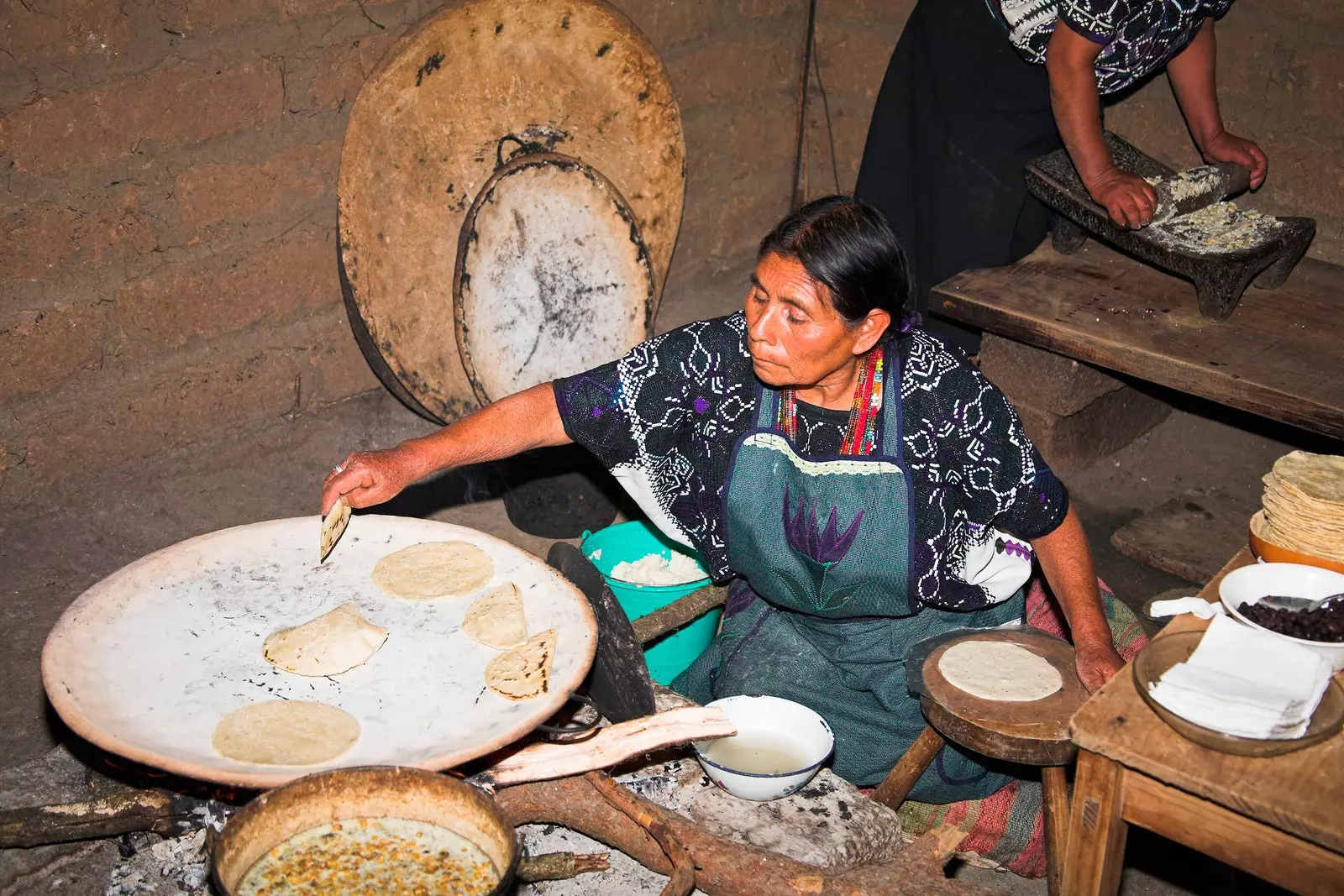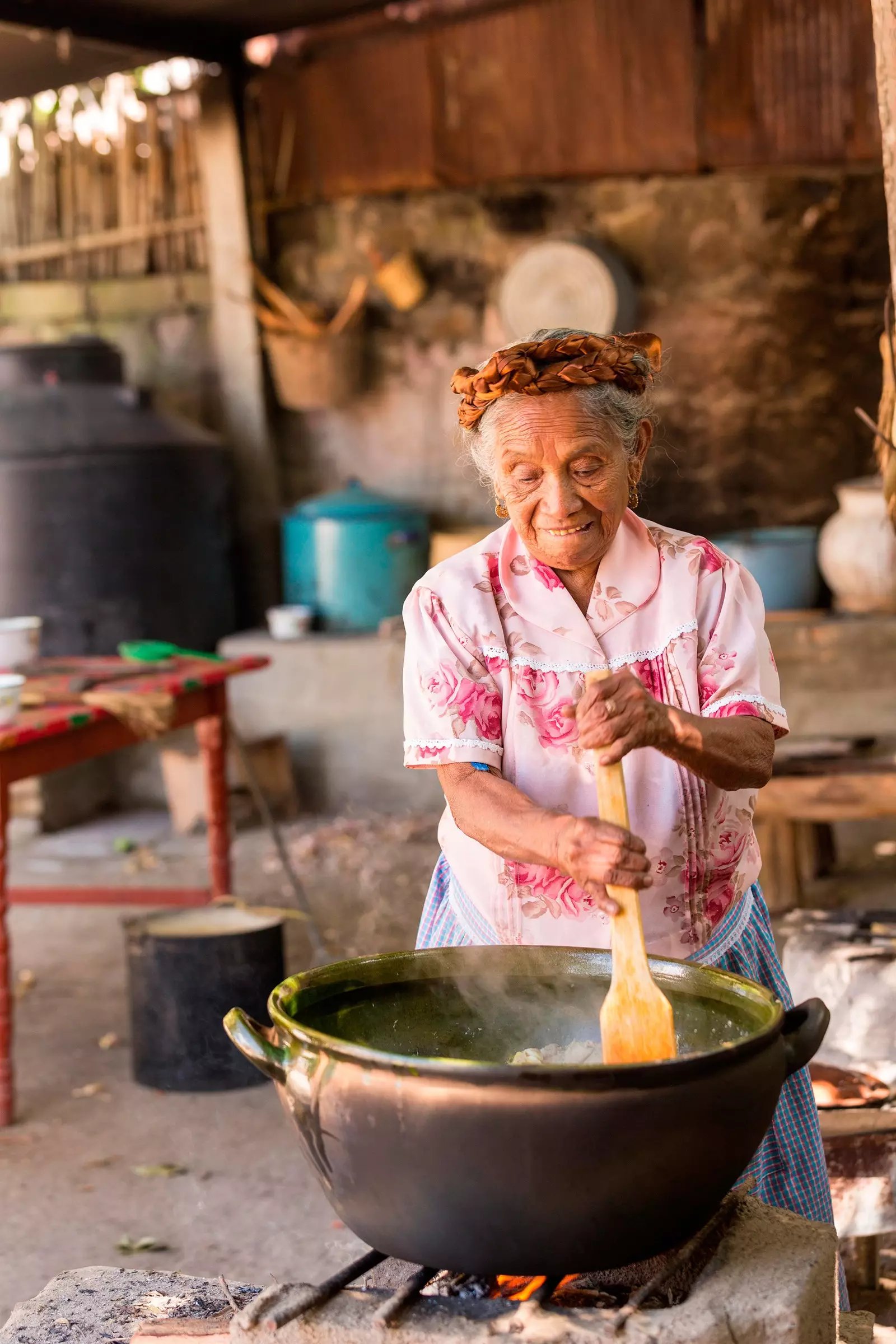
Woman cooking in San Cristóbal de las Casas, Chiapas
White chefs cooking mexican food . A poisoned equation according to the journalist's point of view Maria Ines Zamudio , whose blood boiled and her fingertips were burned before posting a denouncing tweet. She knew her message would be prickly, but she was aiming end systematic looting and abuse of power in broad daylight . The demonstration that cultural appropriation , so related to music, also affected the Mexican gastronomy . And the worst thing was that the crime was being carried out with the explicit consent of many of her compatriots.
"Tired of white chefs going to Oaxaca and other states in Mexico, learning to prepare delicious food with the ladies and then come back to write a book or host a TV show. Those ladies should be paid properly. Pay."
It was to be expected that the group Women of Corn , created in 1997 in Los Angeles with the mission of empower Latina women through the creation of community spaces such as the kitchen , will not sit idly by. They used their loudspeaker to spread the message with all their might. "Pay", they repeated . In an instant, Twitter was a hotbed of conflicting opinions . While for many Mexicans it should be reason for pride that several foreign chefs wanted to spread the benefits of traditional Mexican cuisine throughout the world, for many others it was denounceable that The West will shoot its gastronomic heritage without deep reflection and, something worse, without any type of economic compensation for its creators.
”I see these Mexican cooking shows and how white cooks take over the recipes of mexican grannies . Also, these white cooks They sell sauces and spices like Mexican when they are produced in an industrialized way from the recipes of ladies who do not receive a penny ”, they said validating the thesis. Instead, others argued just the opposite: “I'm glad you took the time to** learn our culture and take it to a different place**! It is a sign of respect and admiration for our culture. To the naysayers, tell them that this is how culture works. Why don't we pay Lebanon for our tacos al pastor? Or for making pizza in Mexico? Or by the great Mexican chefs who learned techniques from kitchens from all over the world? This is not appropriation, it is an incorrect analogy”.
Without a doubt, this is not an exclusive topic of Mexican gastronomy, since it can be extrapolated to other cuisines that are very present in the United States . It is the case of the Hawaiian with the poke bowl or the Peruvian with the Ceviche , who at the time already raised their voices for the same reason. And it is that, if it is already complicated address recipes from cultures other than their own , the thing enters quicksand when trying to do business and get rich with that knowledge acquired. When can it be considered an inspiration or a tribute and when does it fall into plagiarism? What happens when that original recipe is changed to adapt it to the tastes of the dominant culture? And there is still more: if the recipe in question comes from the tradition of peoples historically punished by racism, can a privileged white cook take all the credit and walk away unscathed?
Chef Rick Bayless was on the minds of many of the complainers. A white cook from Oklahoma, owner of very successful Mexican restaurants in Chicago and Los Angeles who also markets Mexican sauces that are sold throughout the nation . His popularity has become so ingrained among Mexicans residing in the United States that he is better known than any Mexican cook from his home country . In a Sporkful podcast related to this controversy, the Professor Krishnendu Ray, Chairman of the Department of Food Studies at New York University , understood the frustration that this anomaly could generate. “ White chefs like Bayless have more freedom to play with food than chefs of other races. ”. Bayless did not remain silent and counterattacked. "Because I'm white, I can't do anything with Mexican food? If you think about it, you say to yourself: 'Wait a minute, this is racism.'"
Paloma Ortiz, Mexican cook and restaurant and hotel consultant for Mexican cuisine in Spain partially coincides with the journalist's complaint. Nevertheless, she believes the debate should not focus on white chefs in particular , as if they were guilty of plagiarism in all cases. “There is everything”, he assures for Condé Nast Traveler Spain, “ people who come to plagiarize and people who are dedicated to research and dissemination . What I consider most important is preserve cymbal conservation work Y Mexican cooking techniques that these women do in all the communities of the republic. It is true that many chefs arrive, both foreign and local, to learn from the great traditional cooks we have in the country, but I don't see it as a bad thing. On the contrary, I consider that the spread of true Mexican cuisine around the world is important to eradicate the current idea of calling Mexican cuisine 4 or 5 dishes that do not represent the reality of Mexico.”
The truth is that there is very little diversity of offer in Mexican restaurants in the United States or Europe . Most opt for the infallible formula based on 3 top sellers: tacos, burritos and fajitas with the same fillings as always (roast meat, carnitas or al pastor). Either that or they brazenly opt for the tex mex cuisine , which has little or nothing to do with the original recipes in the homes of Mexican families from north to south. It is no coincidence that many Mexicans living abroad share the same feeling of miss a good slow-cooked mole.
"We must give the value it deserves to the work of these women," emphasizes Paloma Ortiz. “ It is a tangible reality that the necessary credits are not given to the people from whom one learns . Beyond receiving an isolated salary for a course or a demonstration, in the few cases in which such remuneration exists, I think it would be good to develop the social fabric of the communities that transmit the culinary richness that is so little known in Mexico.”.
That is the big question beyond a weight of more or less: as a form of thanks, What if these privileged white chefs somehow helped the communities from which they profit commercially? “Many of the traditional cooks have products for sale that are lovingly grown by their families. Others have kitchens or small restaurants in their towns, others make handicrafts of great value to be able to cook, and others even offer tours or cooking classes. Generating a support circuit would be a tribute of greater depth”.
A good example of cooperation between Mexico and the US is the small business My land. Michael Docter , an American farmer, joined forces with the Mexican couple formed by George and Dora , former restaurant owners in New England. From there have emerged ancestral Mexican products based on the ancient methods of nixtamalization , with locally grown organic corn for make delicious fresh tortillas at popular prices . A product almost impossible to find in conventional points of sale, and that pays dividends to Mexicans and Americans in equal parts.
Regarding the blatant plagiarism of recipes without citing the sources , Paloma Ortiz considers that has always existed and will continue to exist . “Seeing what others do and then putting a personal touch on a recipe is part of the syncretism of popular gastronomic culture . The kitchen has an alchemy base! The kitchen is a coming and going of techniques , ingredients, presentations and flavors. Of invention, mixture and trial and error. However, I believe that traditional kitchens deserve a very particular respect and should be replicated as they are. Without tropicalizing its content ”. Something that UNESCO already made clear in 2010, declaring traditional Mexican cuisine as Intangible Heritage of Humanity.
In conclusion, it all boils down to not only international chefs visit the different corners of Mexico . “Mexican cuisine is so broad that national chefs also need to learn and study the gastronomy of our country . It is true that, probably, much of the Mexican workforce is poorly paid in the kitchens of various countries, but the collective effort to preserve the roots of your culture is stronger. If circumstances have put you in an expatriate position, what always brings you back to the origin is the food of your culture ”, defends Paloma Ortiz.

Mexican grandmother cooking at the El Sabor Zapoteco Cooking School, in Teotitlán
